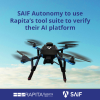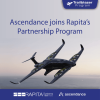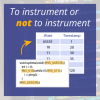Back to Top
Contact Us
York, UK, 15th November 2010
A paper by Robert Davis of Rapita Systems has become the most downloaded from the Real-Time Systems journal.
“Controller Area Network (CAN) schedulability analysis: Refuted, revisited and revised” identified flaws in the original analysis from the 1990s and recommended ways to revise schedulability analysis tools. The paper was co-written with Alan Burns, Reinder J. Bril and Johan J. Lukkien.
“I am delighted that this important work, with its high impact and relevance to the automotive industry, is receiving such wide attention from both industry and academia”, said Robert Davis.
Here is the original Abstract:
Controller Area Network (CAN) is used extensively in automotive applications, with in excess of 400 million CAN enabled microcontrollers manufactured each year. In 1994 schedulability analysis was developed for CAN, showing how worst-case response times of CAN messages could be calculated and hence guarantees provided that message response times would not exceed their deadlines. This seminal research has been cited in over 200 subsequent papers and transferred to industry in the form of commercial CAN schedulability analysis tools. These tools have been used by a large number of major automotive manufacturers in the design of in-vehicle networks for a wide range of cars, millions of which have been manufactured during the last decade. This paper shows that the original schedulability analysis given for CAN messages is flawed. It may provide guarantees for messages that will in fact miss their deadlines in the worst-case. This paper provides revised analysis resolving the problems with the original approach. Further, it highlights that the priority assignment policy, previously claimed to be optimal for CAN, is not in fact optimal and cites a method of obtaining an optimal priority ordering that is applicable to CAN. The paper discusses the possible impact on commercial CAN systems designed and developed using flawed schedulability analysis and makes recommendations for the revision of CAN schedulability analysis tools.
Visit www.springerlink.com to download the paper in full.

 Rapita partners with Asterios Technologies to deliver solutions in multicore certification
Rapita partners with Asterios Technologies to deliver solutions in multicore certification
 SAIF Autonomy to use RVS to verify their groundbreaking AI platform
SAIF Autonomy to use RVS to verify their groundbreaking AI platform
 Hybrid electric pioneers, Ascendance, join Rapita Systems Trailblazer Partnership Program
Hybrid electric pioneers, Ascendance, join Rapita Systems Trailblazer Partnership Program
 How emulation can reduce avionics verification costs: Sim68020
How emulation can reduce avionics verification costs: Sim68020
 Multicore timing analysis: to instrument or not to instrument
Multicore timing analysis: to instrument or not to instrument
 How to certify multicore processors - what is everyone asking?
How to certify multicore processors - what is everyone asking?
 Data Coupling Basics in DO-178C
Data Coupling Basics in DO-178C
 Certifying Unmanned Aircraft Systems
Certifying Unmanned Aircraft Systems
 DO-278A Guidance: Introduction to RTCA DO-278 approval
DO-278A Guidance: Introduction to RTCA DO-278 approval
 ISO 26262
ISO 26262
 Data Coupling & Control Coupling
Data Coupling & Control Coupling
 DASC 2025
DASC 2025
 DO-178C Multicore In-person Training (Fort Worth, TX)
DO-178C Multicore In-person Training (Fort Worth, TX)
 DO-178C Multicore In-person Training (Toulouse)
DO-178C Multicore In-person Training (Toulouse)
 HISC 2025
HISC 2025










